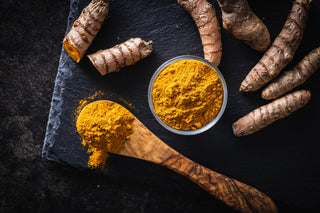What is Curcumin?
Curcumin is the main active ingredient in Turmeric. Turmeric is native to Southeast Asia, but is popular all over the world. Perhaps the most popular in India, where it is one of the main spices in curry powders. Turmeric’s flavor is warm and bitter, and it has a striking yellow color. Over the past few decades, there has been increased interest and research into turmeric’s reputation for healing. Curcumin is the main focus of the research, as it’s the source of many of turmeric’s health properties.
Curcumin is a discreet bioactive compound and is what gives turmeric its bright colour. The first isolation by scientists was around the turn of the 20th century, and its antibacterial properties were first demonstrated in 1949. Subsequent research showed curcumin to have anti-inflammatory, anti-oxidant, and several other beneficial properties.
Benefits of Curcumin
As mentioned there are several beneficial properties of curcumin, but probably the one it is most well known for is its anti-inflammatory properties. Some studies point towards curcumin being among the most effective anti-inflammatory compounds, even when compared to certain anti-inflammatory drugs used for joint pain. This is due in large part to its anti-inflammatory properties. Inflammation can manifest as redness, swelling, and warmth in the affected joints, resulting in joint pain, and joint stiffness. Several studies have shown curcumin to be effective for reducing these inflammation symptoms that can contribute to joint issues. Additional studies show some benefits for balancing insulin, regulating cholesterol and potentially reducing obesity.
How to Use Turmeric
Since turmeric is a root powder, turmeric and by extension curcumin, is not easily absorbed on its own. In order to improve the absorption of turmeric, healthy fats and black pepper are often combined with it. This is why you will see in many dishes, such as curry, that coconut milk and black pepper are added. Another recipe that has been gaining popularity is turmeric tea, or golden milk. The tea is prepared often with coconut milk or other forms of milk, and sometimes black pepper is also included in order to improve absorption.
For some people it is easier to use a supplement. Many supplements will combine black pepper, or piperine, with the turmeric. This is done to aid in making the turmeric more bioavailable, or easier to absorb.
Who Should Use Curcumin?
There are very few side effects or health risks known to be associated with curcumin. However, in a study that involved participants ingesting extremely high doses of curcumin, some reported diarrhea, headache, nausea, and yellow stool. The Allowable Daily Intake (ADI) value of curcumin has been determined by the European Food Safety Authority to be 0-3 mg per kilogram of body weight, or roughly 0-1.4 mg per pound. When attempting to take higher doses of turmeric, using a supplement can be beneficial.
There are also medications that may not combine well with turmeric, particularly blood thinners or anti-platelet medication. Additional considerations may include: gallstones, bile duct obstruction, stomach ulcers or excess stomach acid. If any of these apply, then it would be best to consult with you healthcare practitioner.

